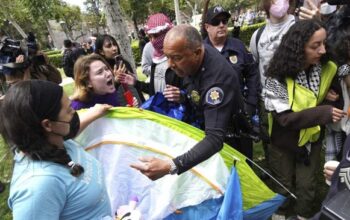San Fran wants to update its tax structure. Not for the purpose of allowing people to keep more of the money they earn, but to get more money from the middle class and poor. This, in a city that is facing financial collapse, hundreds of billions in “reparations” and tech firms leaving the city as quickly as leases have expired. Downtown is a ghost area—and tourists need to know that need to bring their own protection from criminals.
“The City taxes commercial rents. It now taxes properties if you don’t rent them — that’s a new commercial vacancy tax. It taxes cannabis dispensaries, parking, stadium admissions, sugary drinks and fire alarms. It taxes every phone line a business operates, whether it’s a landline or mobile. There’s a cigarette litter abatement fee and a traffic congestion mitigation tax.
But the biggest tax on businesses, and the one that confounds me the most, is San Francisco’s gross receipts tax, which 2020’s Prop. F ostensibly overhauled.
A tax on gross receipts sounds a bit like an income tax. But the complexity comes in the way San Francisco defines “gross receipts.” The City looks at what you pull in worldwide, and then compares it to what you pull in within San Francisco proper. But it also looks at how much of your payroll is within the City. And payroll counts more for some businesses than others.
In all, San Fran has a total of 180 different taxes (not a typo).
Workers have moved on to a hybrid future. S.F’s taxes are stuck in the past

By Owen Thomas, SF Examiner 2/3/23
February is a short month, but it promises to be a busy one for accountants. San Francisco business taxes are due at the end of the month, and companies can expect many unhappy returns — especially if they’ve embraced the trendy new world of hybrid work, where employees might show up in the office a couple days of week, perhaps, if they feel like it.
Here’s the fundamental problem: San Francisco last attempted meaningful reform of its business taxes in 2020 without really grappling with the absurd complexity of its system. And it’s since layered on more.
In the heat of the local techlash in 2019, several measures to tax big businesses in The City lumbered toward the ballot. Eventually, Mayor London Breed and then-Board of Supervisors President Norman Yee worked out a compromise measure, the Small Business and Economic Recovery Act, also known as Proposition F. A key selling point was that it would get rid of the last vestiges of a despised, derided payroll tax.
Except it didn’t, really. And that is a crucial problem as The City grapples with encouraging both businesses and workers to plant their butts back in seats downtown.
The Office of the Treasurer & Tax Collector says it “collects more than 180 taxes and fees that are required by the San Francisco Business and Tax Regulations Code.” Hey, it’s just doing its job. It’s really the City’s politicians who are responsible for that laundry list of taxes (as well as the voters who make them law).
The City taxes commercial rents. It now taxes properties if you don’t rent them — that’s a new commercial vacancy tax. It taxes cannabis dispensaries, parking, stadium admissions, sugary drinks and fire alarms. It taxes every phone line a business operates, whether it’s a landline or mobile. There’s a cigarette litter abatement fee and a traffic congestion mitigation tax.
But the biggest tax on businesses, and the one that confounds me the most, is San Francisco’s gross receipts tax, which 2020’s Prop. F ostensibly overhauled.
A tax on gross receipts sounds a bit like an income tax. But the complexity comes in the way San Francisco defines “gross receipts.” The City looks at what you pull in worldwide, and then compares it to what you pull in within San Francisco proper. But it also looks at how much of your payroll is within the City. And payroll counts more for some businesses than others.
Proposition F changed the rates on businesses, mostly raising them, and eliminated some inequities, like a higher rate on financial services businesses than on “information” businesses (read: most of tech).
The higher rate grated on some finance-adjacent tech businesses that got lumped in with big banks, like payment processors. Block, then known as Square, sued San Francisco multiple times over its tax bill, in part because of its treatment as a financial business. Stripe, whose CEO, Patrick Collison, complained about San Francisco’s taxes, moved its headquarters to South San Francisco and at one point offered to pay San Francisco- based employees a bonus to move out of town.
It wasn’t just the rate on every dollar that annoyed companies, though: It was San Francisco’s system of charging based on local payroll, which still hits financial businesses more heavily than information or services businesses. It’s a little-noticed, arbitrary leftover of the last time San Francisco reformed its business taxes, left unchanged by Prop. F.
Getting rid of the last vestiges of San Francisco’s payroll tax was a popular talking point for Prop. F: Payroll taxes discourage job creation. But voters who didn’t dig into the tax code’s arcana may not have realized that for a lot of companies, the gross receipts tax is really a stealth payroll tax.
Your head’s probably spinning trying to keep up with these details of the tax system. Now try to grapple with this: How do you account for payroll when your workforce is all over the place?
A worker who lives in San Francisco, sometimes works from home and sometimes goes downtown to an office is easy. Their payroll counts as San Francisco payroll. But what about someone who got a Sonoma pandemic pad, sometimes works there, sometimes comes to a San Francisco office, and sometimes works from home in the studio apartment they kept in the Mission? Believe it or not, companies are counting office-door keycard swipes and studying mailing addresses in an attempt to calculate the exact portion of their payroll attributable to San Francisco.
All those companies that have been encouraging workers to come back to downtown offices might think again when they see their gross receipts tax bill. The fewer that show up, the lower the bill — assuming they live out of town. Maybe more will pull a Stripe and pay them to move.
There is a perverse upside to the gross receipts tax in the age of hybrid work. All those Googlers and Facebookers — sorry, Alphabetans and Metamates — working from home in San Francisco instead of riding a bus down 101 now up their employers’ bills. If they’re still working, that is: Thousands have been recently laid off, and less payroll means less tax revenue for The City.
The truth is that — particularly for Big Tech companies — the gross receipts tax is more of a bother than a burden. Trying to understand it feels almost like an archaeological dig, layer after layer after layer, a legacy of the way it was rolled out as a replacement for the City’s payroll tax.
Yet a payroll tax labeled as such feels more honest. The gross receipts tax is sneaky. And that’s without even asking whether we get what we pay for in public services.
We are likely years away from any new reform. Right now, the City’s finances seem rocky, with looming deficits from a forecasted shortfall in tax receipts and uncertainty over the economy. The good news is that even with tech layoffs, unemployment is near an all-time low of 2% and the local economy surprisingly even added jobs in December, according to The City’s Office of Economic Analysis: retail, professional services and other sectors made up for a drop in information jobs.
Here’s an idea for a grand bargain: Do a big-bang simplification of the tax structure, eliminating a substantial number of those 180-plus charges, and implement a spending overhaul, in exchange for a commitment by businesses to stay and grow in San Francisco. That kind of collaboration has worked before in pushing big reforms. We just didn’t go far enough. And we have to face it: The status quo is gross.



